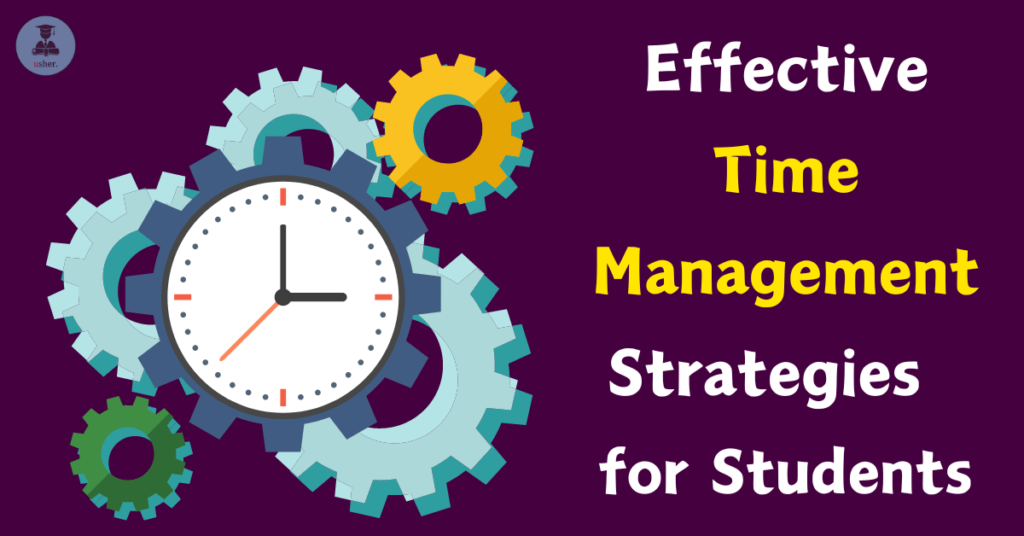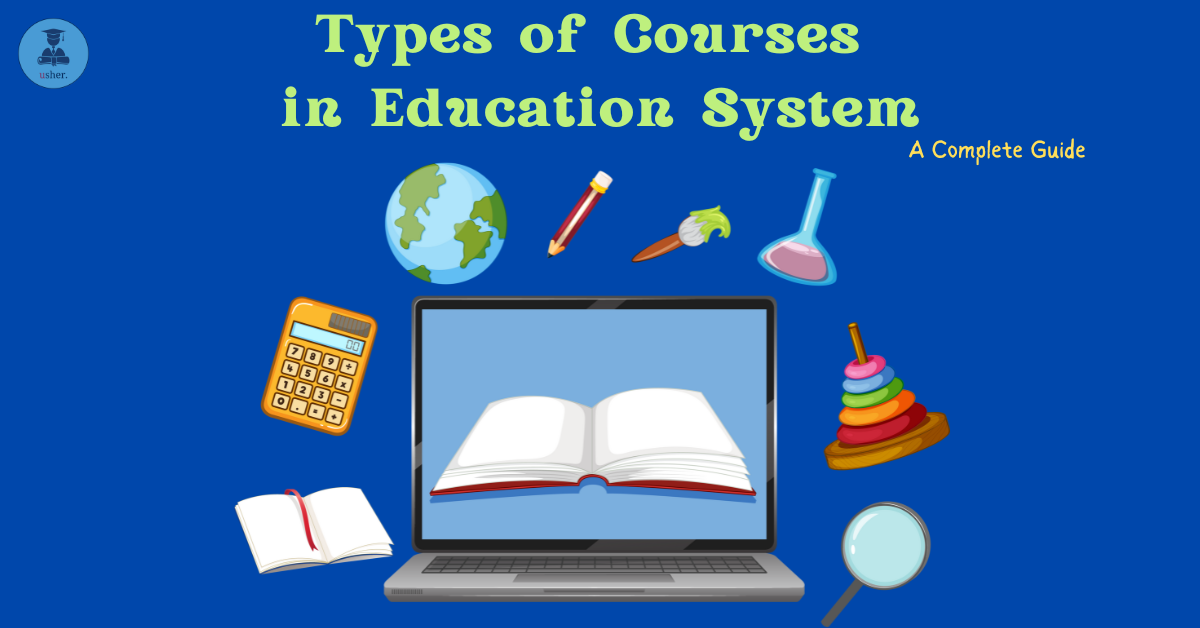75% of students struggle with procrastination.
33% of college students need help with planning their schedule.
These statistics reveal one common problem among students: Time Management.
In today’s fast-paced world, mastering time management is essential for achieving success and maintaining a balanced life. Having strong time management skills can help students stay organized and focused on their goals.
Yet, many students struggle with managing their time efficiently, often feeling overwhelmed by endless to-do lists and constant distractions.
This blog will explore proven time management strategies that can transform the way you approach your tasks and responsibilities. From prioritizing effectively and setting SMART goals to eliminating distractions and taking necessary breaks, these techniques will help you make the most of your time.
These tips are designed to empower you to take control of your schedule and achieve your goals with confidence.
Why is time management important for students?
Before we talk about the strategies, let us understand why time management is crucial for academic success.
Creating a purpose for your day is the key to effective time management for everyone, even students. It all comes down to managing the time you have and making the most of it for balance, productivity, and concentration.
Efficient time management allows students to
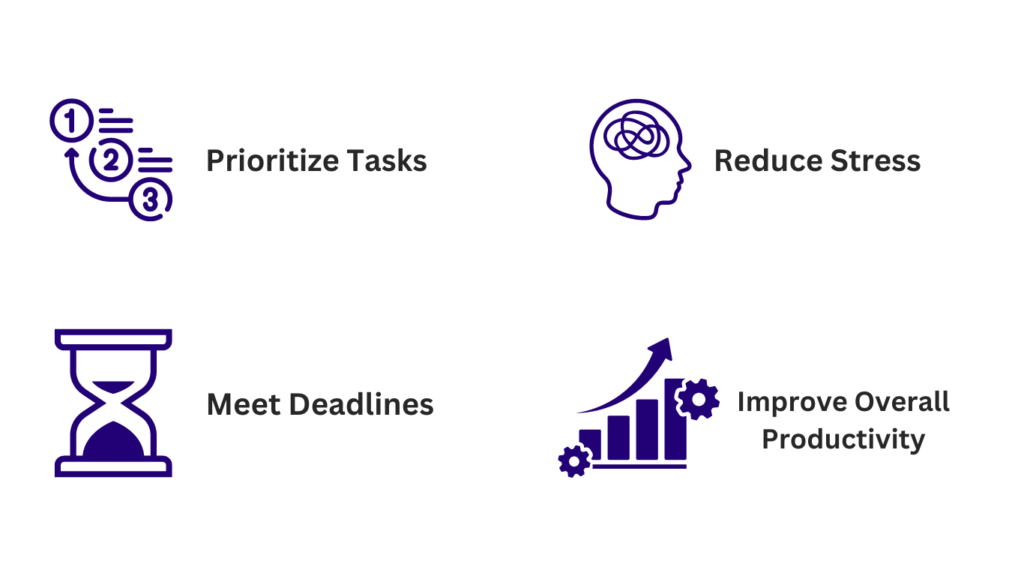
By mastering time management skills, students can create a balanced schedule that maximizes their academic performance while still allowing time for personal interests and activities.
Time management is also a key component of building a top notch student personality.
Let’s dive deep into different effective time management strategies.
Strategy Number 1
Prioritize Your Tasks
Prioritizing tasks is essential for managing time efficiently and ensuring that the most important tasks are completed first. It helps focus efforts on activities that offer the most significant benefits. By prioritizing tasks, you can avoid feeling overwhelmed and ensure that you are working on what truly matters. This strategy will help you stay organized and on track to achieve your goals effectively.
Here are a couple of examples to illustrate how prioritizing tasks can lead to increased productivity and time management.
Eisenhower Matrix: The Eisenhower Matrix categorizes tasks into four quadrants based on urgency and importance:

ABC Method: The ABC method involves categorizing tasks into three groups:
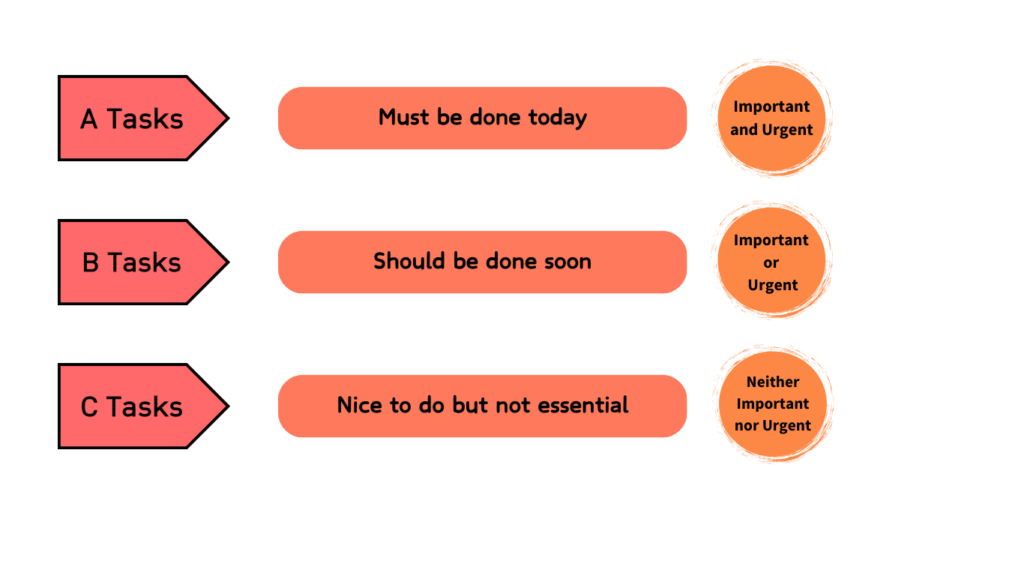
Practical Tips: Use task management apps or to-do lists to prioritize daily tasks. Regularly review and adjust priorities based on changing circumstances and deadlines.
Strategy Number 2
Set SMART Goals
SMART goals are Specific, Measurable, Achievable, Relevant, and Time-bound. This framework ensures that goals are clear and attainable within a specific timeframe.
Benefits: Setting SMART goals provides direction, motivation, and a clear path to achieving objectives. It allows for progress tracking and adjustments as needed.
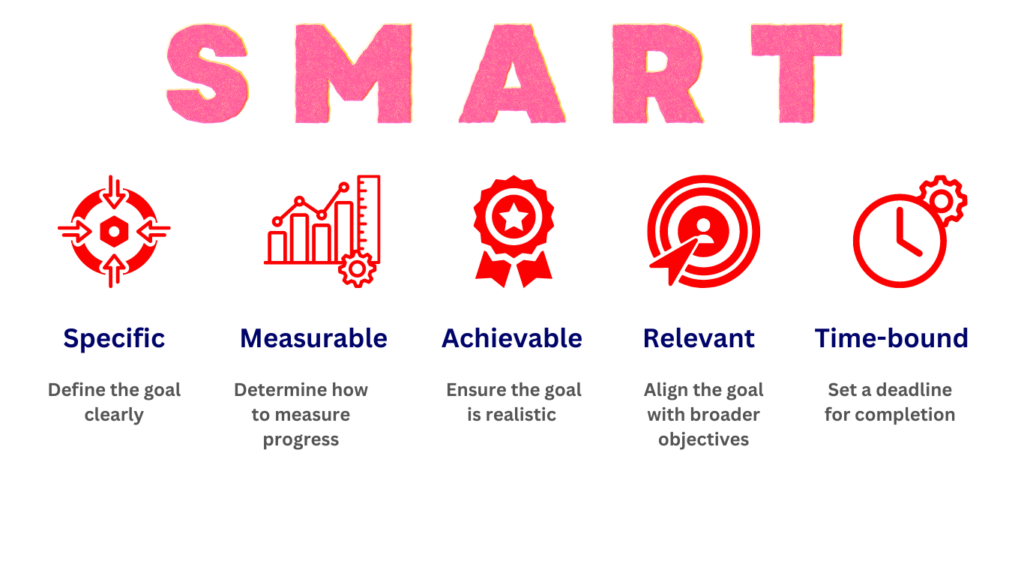
Examples: Instead of saying, “I want to be more productive,” say, “I will complete three major projects by the end of the month.”
Strategy Number 3
Plan and Schedule
Daily and Weekly Planning: Plan your day and week to allocate time for different tasks and activities. This helps in managing time effectively and avoiding last-minute rushes.
Time Blocking: Allocate specific time slots for different tasks. This allows you to focus on one task at a time and stay organized throughout the day.
Use of Tools: Utilize planning tools and apps like Google Calendar, Trello, or Asana to organize tasks and keep track of deadlines.
Consistency: Make planning a daily habit to stay organized and on track. Review and adjust your plans regularly.
Strategy Number 4
Eliminate Distractions
Recognize distractions such as social media, phone notifications, and unnecessary meetings that hinder productivity and try to minimize or eliminate them. By creating a distraction-free study environment, you can improve your focus and efficiency. Organize your study-space to reduce clutter and create a conducive environment for concentration.
Strategies to Minimize Distractions:
- Turn off notifications: Silence or disable non-essential notifications.
- Use focus apps: Apps like Freedom or StayFocusd can block distracting websites.
- Create a dedicated workspace: Designate a specific area for study to minimize interruptions.
Also read: Impact of social media on Students
Strategy Number 5
Delegate and Outsource
Delegation involves assigning tasks to others, allowing you to focus on higher-priority activities.
You must learn to delegate tasks that are not essential for you to complete personally. By delegating or outsourcing tasks, you can free up your time and focus on more important priorities. This can help reduce distractions and improve overall productivity in the long run.
How to Delegate Effectively:
- Choose the right person: Assign tasks based on individuals’ skills and strengths.
- Clearly define tasks: Provide clear instructions and expectations.
Strategy Number 6
Take Breaks and Rest
Taking breaks and resting are essential for maintaining productivity and preventing burnout. By allowing yourself time to recharge, you can come back to tasks with a fresh perspective and renewed energy.
Regular breaks prevent burnout and maintain productivity.
Utilize the pomodoro technique to take short breaks between tasks by working in focused sessions (for example, 25 minutes), then a short break (for example, 5 minutes). After four sessions, take a longer break.
Strategy Number 7
Continuous Improvement
Continuous improvement encourages you to regularly assess your performance and reflect on how you spend your time. By identifying areas where time is wasted or used inefficiently, you can make the necessary adjustments.
Continuous improvement also involves seeking and utilizing feedback from teachers, peers, and self-assessments to continually adjust and improve time management strategies. This iterative process helps students find what works best for them.
Benefits of Effective Time Management
Effective time management is a valuable skill that offers numerous benefits across various aspects of life. Here’s a detailed look at the key benefits:
– Increased Productivity
Effective time management allows individuals to accomplish more in less time by focusing on the most important tasks first. When you prioritize your work and allocate specific time slots for each task, you enhance your productivity. Utilizing tools such as to-do lists, planners, and time-tracking apps can further streamline your workflow. This approach reduces the time spent on unimportant activities and increases the amount of high-quality work completed.
– Reduced Stress
Proper time management reduces the stress associated with looming deadlines and the chaos of last-minute work. By planning ahead and breaking tasks into manageable chunks, you can avoid the anxiety of unexpected assignments. Knowing that you have a clear plan and enough time to complete your tasks can significantly lower stress levels, leading to better mental health and overall well-being.
– Better Work-Life Balance
Efficient time management helps create a balance between professional responsibilities and personal life. By organizing your tasks and setting boundaries, you can ensure that work does not encroach on personal time. This balance is crucial for maintaining healthy relationships, pursuing hobbies, and taking time for self-care, all of which contribute to a fulfilling life.
– Improved Focus
When you allocate specific time periods to tasks, you can concentrate better and avoid distractions. Techniques like time blocking and the Pomodoro Technique, which involves working in focused intervals with short breaks in between, can help maintain high levels of concentration. This focused approach allows you to complete tasks more efficiently and with higher quality.
– Goal Achievement
Setting and managing your time effectively is crucial for achieving both short-term and long-term goals. By breaking down large goals into smaller, actionable tasks and scheduling time to work on them, you make consistent progress. This systematic approach ensures that you stay on track and reach your goals within the desired timeframe.
– Enhanced Decision-Making
Prioritizing tasks helps in making better decisions about how to use your time. By identifying which tasks are most important and urgent, you can focus on what truly matters. This strategic approach helps you avoid spending time on less important activities and ensures that your efforts are aligned with your priorities and goals.
– Increased Free Time
Effective time management often results in more free time. When tasks are completed efficiently, you have more time to spend on leisure activities, hobbies, and relaxation. This additional free time is essential for recharging and maintaining a high level of productivity over the long term.
– Professional Growth
In the workplace, effective time management is a key factor in career advancement. Employers value employees who can manage their time well and deliver results efficiently. By demonstrating strong time management skills, you increase your chances of getting promotions, raises, and new opportunities.
– Enhanced Personal Development
Time management also plays a significant role in personal development. By efficiently managing your time, you can dedicate more hours to learning new skills, pursuing educational opportunities, and engaging in activities that contribute to personal growth. This continuous learning and development can lead to a more fulfilling and successful life.
– Better Health
Managing time effectively can also positively impact your physical health. With proper planning, you can allocate time for regular exercise, healthy eating, and adequate sleep. These habits are crucial for maintaining good health and preventing burnout.
What have we learned?
Effective time management requires a combination of prioritization, goal setting, planning, minimizing distractions, delegation, taking breaks, and continuous improvement. Implementing these strategies can help you manage your time better, increase productivity, and achieve your goals efficiently.
Additional Resources

“Eat That Frog!” by Brian Tracy is a great resource for learning how to prioritize tasks and manage time effectively. It talks about the importance of tackling the most important tasks first and avoiding procrastination. Tracy emphasizes the significance of focusing on high-value activities that align with your goals rather than getting caught up in low-priority tasks.
I recommend this book to every school-going student.
Also read: Top Books Every Student Must Read
Ankur Warikoo’s course on time management, “TAKE CHARGE OF YOUR TIME“ and Dhruv Rathee’s “How to do a Million Things All at Once” time management course are some of the best courses that help you manage your time efficiently.
For students who want to increase their productivity and time management abilities, both of them are highly recommended. These resources offer doable tactics and methods that can be used to succeed in a variety of spheres of life.

